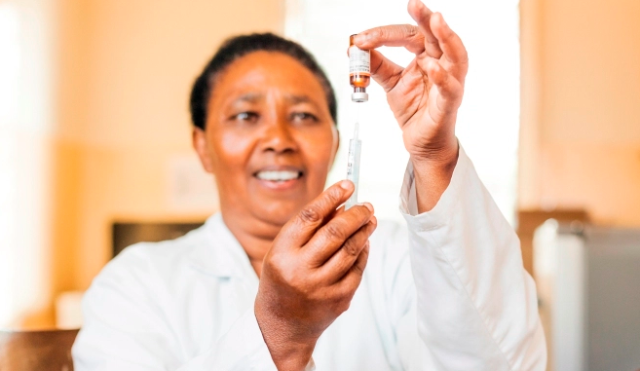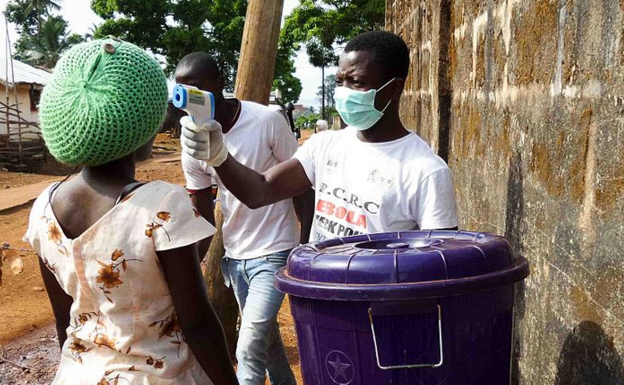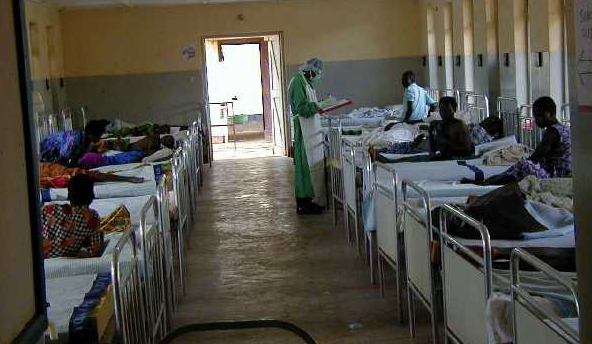BTN.com staff, February 8, 2016
 When the Ebola virus - which killed or infected nearly 40,000 people in Africa - entered the United States in 2014, a public panic ensued. The collective fear eventually subsided, thanks to medical and public-health officials effectively containing and stopping the virus? spread through action, education and vigilance.
When the Ebola virus - which killed or infected nearly 40,000 people in Africa - entered the United States in 2014, a public panic ensued. The collective fear eventually subsided, thanks to medical and public-health officials effectively containing and stopping the virus? spread through action, education and vigilance.
If the Ebola outbreak had a silver lining, it was in how it brought to light the fact that many countries lack the resources needed to respond to a pandemic threat, said Dr. John Deen, a professor at University of Minnesota?s College of Veterinary Medicine.
?It wasn?t simply the identification or presence of this virus,? he said. ?It was readily apparent in the affected countries that the ability to contain and respond to it in a forthright manner just wasn?t in place.?
In order to help to these nations respond to the next threat on that scale, the United States Agency for International Development (USAID) has awarded a five-year grant of up to $50 million to support the development of the One Health Workforce, of which Deen is the director. He and a team at Minnesota are building a multinational collaboration to strengthen responses to emerging pandemic threats - not only between universities, but also between countries.
?These new diseases do not respect boundaries, and we have to emulate that method,? Deen said.
He acknowledged that some might be surprised to hear veterinary medicine mentioned alongside the topic of human infectious diseases, but he explained that many of those diseases often originate in animals.
?We often call it ?spillover? between species,? he explained. ?Some of the major emerging diseases we?ve seen over the last few decades come out of animal populations: HIV, the current outbreak of MERS, some of the influenza viruses as well. New diseases have a repository, and it is at that animal interface.?
In addition to the loss of human lives, a pandemic causes serious collateral damage.
[btn-post-package]?[These outbreaks] are often new diseases that we do not immediately have the resources to understand, analyze or control them, and it causes fear, and disruption to society and economies,? Deen said. ?It wasn't only the fact that people died from Ebola in Guinea, Liberia and Sierra Leon, but that society came to a stop. Crops were not harvested. Schools did not operate. That level of effect of the emerging diseases makes it one of the major concerns for stability of entire countries.?
The University of Minnesota is uniquely qualified to help lead the One Health Workforce due to its non-siloed approach to education, Deen said. The school has even developed a combination Doctorate of Veterinary Medicine/Masters of Public Health degree, acknowledging the important intersection of these two disciplines.
Deen explained that a primary focus of the One Health Workforce will be on predicting where these outbreaks might occur. For instance, Ebola originated in bats, which necessitates a certain kind of approach.
?We need to have some kind of monitoring in place, not only of humans, but of the source species,? he said. ?Then there is the question: ?Can behaviors be changed?? Whether it is the consumption or hunting of bats, or working in caves, we?re trying to prevent [an outbreak] by reducing that exposure.?
If it can?t be prevented, having proper detection protocol in place is the Workforce?s next goal. Deen explained how important it is to educate the community on identifying those cases early.
Finally, he said, ?We?re trying to reevaluate in our educational system how to solve problems with partial information. We have diseases that by definition are unknown and not understood well. How do we cooperate to create a logical response - and be brave enough and cohesive enough as a community - to do that in a forward fashion??
 As is often the case in public health, Deen explained that the Workforce may being seeing success already, but doesn?t know it.
As is often the case in public health, Deen explained that the Workforce may being seeing success already, but doesn?t know it.
?It?s hard to claim success in the absence of proof,? he said. ?But we?re quite sure that in most countries, an Ebola outbreak would not occur because of the steps in public health management and detection that are already in place. It is in those countries, where they lack the basic skills of prevent, detect and respond, that such outbreaks are possible and where we?re trying to put greater resources.?
Deen pointed out that there?s actually a board game called ?Pandemic,? and noted how it aligns to the overall philosophy of One Health Workforce.
?What?s interesting is that the game isn?t based on teams and competition, or winners and losers,? he explained. ?It?s based on the idea of either everyone loses or everyone wins. That?s the message we?re trying to communicate with [One Health Workforce]. We?re in it together.?
By Betsy Piland







 Basketball is back! Find available live games on our B1G+ app via BigTenPlus.com.
Basketball is back! Find available live games on our B1G+ app via BigTenPlus.com. 